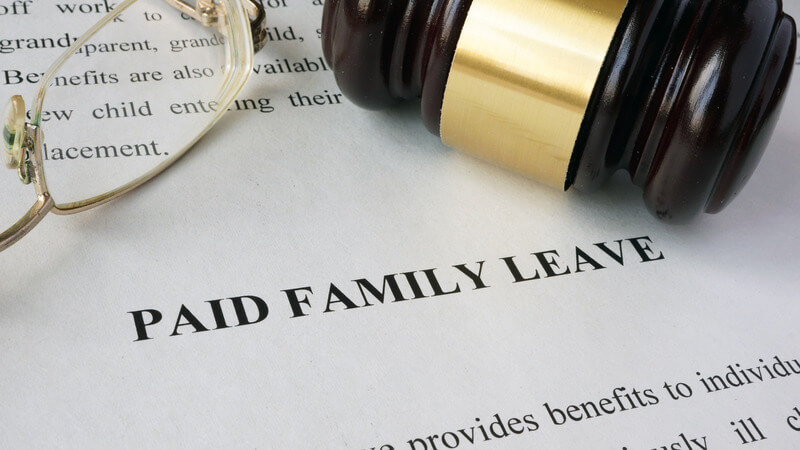Leave of Absence Laws in California

Do you worry about taking time off work for a family emergency? California’s generous leave of absence laws can help.
Whether you need to care for a sick family member, welcome a newborn, or recover from an illness, you may be entitled to protected leave without jeopardizing your job.
Below, we detail California leave of absence programs, helping you understand this crucial aspect of your employment rights.
California’s Leave of Absence Laws
California boasts some of the nation’s most employee-friendly leave of absence laws. These laws empower employees, both salaried and hourly, to take protected leave for various qualified reasons without jeopardizing their job security or benefits. These laws fall under two main categories.
Family and Medical Leave Act (FMLA)
FMLA is a federal law that provides eligible employees with several weeks of unpaid time off from work for qualifying reasons like:
- Serious health condition. You may take unpaid time off for a serious health condition requiring inpatient care, ongoing treatment, or a condition significantly limiting your ability to perform your job functions.
- Family care. FMLA allows you to take time off to care for a spouse, child, or parent with a severe health condition.
- Child bonding. New parents (biological, adoptive, or foster) can take leave to bond with their child.
FMLA applies to employers with 50 or more employees within a 75-mile radius across the country.
California Family Rights Act (CFRA)
The CFRA offers even broader protections than the FMLA, ensuring more California employees qualify for sabbaticals. CFRA offers more generous protections, including:
- Lower employer threshold. CFRA requires smaller companies with at least 5 employees to comply, compared to FMLA’s 50-employee minimum.
- Expanded definition of family. CFRA allows you to take time off to care for a broader range of family members, including registered domestic partners, grandparents, grandchildren, siblings, and parents-in-law.
Both laws protect your job and health benefits during your leave.
How Long Can You Take a Leave of Absence from Work?
You are provided up to 12 weeks off for FMLA or CFRA alone. If eligible, you can receive both CFRA and FMLA, potentially extending the duration of your leave. Additionally, other California leave of absence programs may offer additional leave time.
California’s Other Leave Programs
In addition to FMLA and CFRA, California provides additional leave programs beyond CFRA that offer more protections and benefits, including:
- Paid Family Leave (PFL)—provides up to eight weeks of partial wage replacement (around 60-70% of your earnings), allowing you to bond with a new child or care for a seriously ill family member;
- Pregnancy Disability Leave (PDL)—guarantees qualified employees up to four months of unpaid time off for pregnancy, childbirth, and related medical conditions. This time is essential for new parents to bond with their child and recover from childbirth; and
- Bereavement—provides up to five days of unpaid time off following the death of certain family members.
California’s additional leave programs offer essential protections and support for employees facing various personal situations. These programs can help employees balance work and personal lives during difficult times.
Benefits for California Employees
By having both FMLA and CFRA in place, California employees enjoy significant advantages:
- Greater coverage. The CFRA covers many smaller California businesses that are not FMLA-eligible, ensuring that a broader range of employees can access protected leave.
- Additional qualifying reasons. CFRA recognizes various reasons for taking time off from work, including caring for sick grandparents, grandchildren, siblings, or parents-in-law.
- Longer leave for pregnancy and childbirth. While FMLA offers 12 weeks, PDL allows up to 4 months of unpaid time off for pregnancy, disability, and related medical conditions.
Understanding the differences between California’s leave of absence programs can help you maximize your protected leave time and ensure you take advantage of all available benefits.
How to Request Leave Under FMLA or CFRA
To request leave under FMLA or CFRA, provide written notification to your employer at least 30 days in advance, if possible. Providing adequate notice allows your employer time to make necessary adjustments and ensures a smoother transition for you and your colleagues.
Frequently Asked Questions (FAQs) About Leave of Absence in California
Can My Employer Ask for Medical Documentation to Support My Leave Request?
Yes. Your employer can request medical documentation to verify the seriousness of your health condition or the health condition of a family member requiring your care. However, the information requested must be limited to what’s necessary to confirm your eligibility for time off under these programs.
What Happens to My Health Insurance During Leave?
Your employer is generally obligated to continue your health insurance coverage during your leave if you were enrolled before taking leave and continue to pay your portion of the premium.
Can I Accrue Paid Time Off (PTO) While on Leave?
Under CFRA, your employer is not required to allow you to accrue PTO while away from work. However, some employers have more generous policies that enable their employees to accrue paid time off during their leave. Be sure to check your employee handbook or company policies for more information.
What If My Employer Denies My Leave Request or Retaliates Against Me for Requesting Leave?
If you believe your employer has wrongly denied your request or retaliated against you for taking time off, you can file a complaint with the California Department of Fair Employment and Housing (DFEH). You can also contact one of our employment attorneys to explore your options.
Can I Take Intermittent Leave?
You may be entitled to take intermittent leave, which involves taking time off in smaller intervals rather than all at once, such as two weeks every month for six months. However, your employer may have specific requirements for scheduling intermittent leave, so discuss this with your employer.
Starpoint Law - Your Leave of Absence Advocates
Starpoint Law can assist if your employer denies your leave request, retaliates against you, or fails to reinstate you upon your return. Our experienced California employment lawyers can assess your situation and guide you on the best course of action.
We offer complimentary one-on-one consultations to California employees facing various employment issues, including wage and hour disputes, wrongful termination, and discrimination cases.
Contact us today to discuss your case. Our attorneys aim to empower employees and promote fair treatment in workplaces.
Where You Can Find Our Sherman Oaks Office

